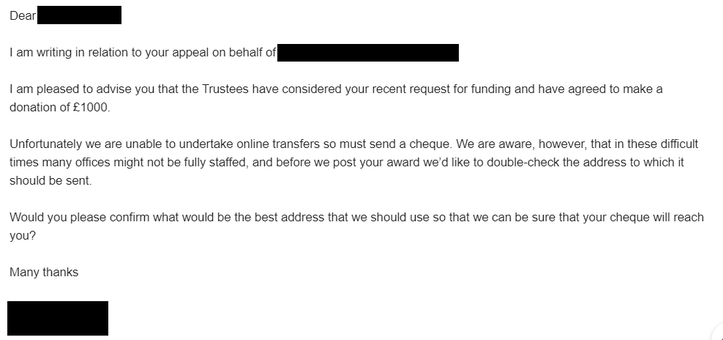|
In our Fundraising During Covid-19 online briefing last week, five different fundraising specialists talked about their recent experiences and what organisations should be looking out for in the next 6-12 months. Here are six lessons from the briefing for fundraisers far and wide... Firstly, a huge thanks to our panel of four external speakers:
1. People are still giving...The headline news from all our speakers was that, for the most part, people are still donating and fundraising. Research in May showed that one-third of UK donors were actually donating more than pre-Covid-19. Louisa highlighted the phenomenal success of mass participation virtual events like the 2.6 Challenge. Claire said that while many charities felt uncomfortable talking about legacies in the early months of the pandemic and stopped doing so, the Law Society actually reported a dramatic growth in will writing - potentially an opportunity missed for the sector. Some charities have been working sensitively with executors to speed up legacy payments to help with cash flow problems. I shared this example of a small family trust that are still giving, and doing what they can to show flexibility and understanding: They may be facing their own challenges, but funders and donors are also responding to events around them - stories in the news, or experiences of illness or tragedy closer to home - which are often prompts for wanting to support good causes. 2. …but they're also facing new pressuresWhile people are still giving, many are feeling the strain of the pandemic – financially, emotionally and in terms of time/capacity. With a recession around the corner and dividend income down, some philanthropists may hesitate about donating, and some companies are slashing Corporate Social Responsibility budgets. Trusts and foundations will be dealing with the same logistical challenges as you – staff furloughed, unwell or struggling with childcare, meetings postponed, and technology hiccups. In such uncertain times, it’s easy to talk yourself out of asking for money at all. This is a mistake. If you don’t ask, you’re denying your funders and supporters an opportunity too, and somebody else will them instead. It’s fine to ask, but be conscious of the challenges people might be experiencing currently, don’t put them under pressure, and listen and respond to feedback. Contact companies and trusts to check on their current situation before applying, to avoid wasting your time and theirs. Listen carefully to your prospective major donors - hearing ‘no’ might not be an absolute rejection, but could just mean no to that amount, no for the next six months, or no to that particular project. 3. Relationships remain crucial, but adapt your approach to building themBuilding relationships is one of our seven universal fundraising rules that will never let you down. But developing relationships amid social distancing, and when your time is stretched, is difficult. While it's been a pleasant surprise just how much can be achieved online in recent months, there's no easy substitute for face-to-face interaction when it comes to getting to know supporters or getting introduced to new contacts. Nevertheless, we mustn’t abandon our attempts to build meaningful relationships. Harpreet told attendees that now is the time to be creative, test new channels, and invest time in ideas and conversations on social media. It could also be a good time to re-examine your lawful basis for getting in touch with your supporters – Harpreet observed that many charities haven’t communicated with some supporters since 2018 because they didn’t give opt-in consent when GDPR came in, but some of these supporters may never have understood why they stopped being contacted. You could explore using ‘legitimate interests’ to get back in touch now. If cancelled events have freed up budget and staff time, consider investing this in phoning supporters and being more active and visible on social media. Don’t hold off communicating with supporters because you don’t have a specific ask ready. Phone them anyway, even just to ask how they’re doing or to update them on your work. Investing time in relationships now will lead to stronger support and donations tomorrow. 4. Keep externalising your case for supportOne speaker observed how many organisations have recently asked for money to ‘keep their doors open’ or avoid laying off staff. Sadly, while this is paramount to you, it's unlikely to be compelling to your donors, unless they’re extremely invested in your organisation. Donors care about the people you support and the positive impact of your work, not keeping you afloat. So you need to be telling inspiring stories and presenting a clear case for support that explains who you help, why they need support, what you do to meet the need, the impact of your work, and why you’re best placed to achieve change. Virtually all our speakers highlighted the importance of a good case for support - for funding applications, individual giving campaigns, major donor asks and legacy fundraising. It’s more important than ever during a crisis, with so many organisations competing for donations and emergency funding. One possible negative impact of the recent Government bailouts for the charity sector and the arts is that the general public might mistakenly perceive that charities are now well-funded. The reality is that these bailouts are tiny in the face of rising need, but it’s up to you to make this case to your supporters. 5. Maintain quality and good practiceWe asked our speakers to explain what hasn’t changed in fundraising since Covid-19, as well as what has - and it was abundantly clear that good practice doesn’t go out the window when a crisis strikes. Time and again, our speakers emphasised the importance of doing things the right way, even when there's a sense of urgency. Louisa talked about the need to plan events well in advance and budget very carefully, especially when social distancing might mean your events have to be smaller-scale and less profitable. Claire highlighted the need to maintain common good practice in legacy fundraising: not leading with a scary focus on death, taking a ‘drip drip’ marketing approach, and always respecting donors’ wishes and wellbeing. It’s easier to keep an emphasis on quality and good practice when you don’t overcommit. For example, you’re likely to make a better impression - and raise more money - if you take the time to write three emergency funding applications well, rather than rushing out eight poor-quality bids. 6. We’re all still figuring things out - so be curious, flexible and kindHarpreet put it best when she said that right now, fundraisers have to be comfortable not knowing all the answers, as we’re all feeling our way in the dark. This is an unprecedented crisis – nobody really knows what is round the corner, or which fundraising tactics will yield the best response. So I believe we need to do three things:
Be curious - test out new messages and ways of communicating with supporters, before committing significant time and budget to them. Measure and reflect on the results. Monitor what other organisations are doing well, and badly. Ask other fundraisers for advice, and sign up for events where people share observations and best practice. Be flexible - lockdown restrictions and public mood are liable to change quickly, so be ready to respond. Your Senior Management Team will need to be more agile and get used to signing off ideas more quickly, or your organisation could be left behind. Be kind - it’s ok to not know what’s round the corner, to make mistakes, and to sometimes just feel overwhelmed and despondent. Equally, Louisa mentioned the importance of celebrating your successes when they come – this keeps you feeling positive, makes the inevitable rejections easier to deal with, and boosts colleagues’ moods too.
0 Comments
Leave a Reply. |
Like this blog? If so then please...
Categories
All
Archive
May 2024
|
Lime Green Consulting is the trading name of Lime Green Consulting & Training Ltd (registered company number 12056332)




 RSS Feed
RSS Feed